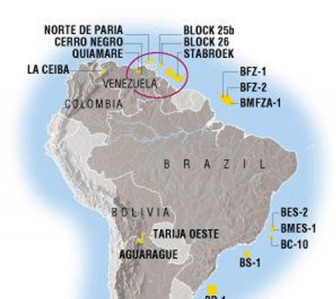Reports emanating from Venezuela yesterday said that the country’s opposition had accused the Hugo Chavez administration of irresponsibility over reports that oil exploration had restarted offshore Essequibo in Guyana, an area claimed by Venezuela.
The area, the Stabroek Block, was awarded to ExxonMobil Corporation in mid 1998 under a production sharing contract. However, exploration was halted following a protest by Venezuela. ExxonMobil had announced on its website back then that it holds a 100% the Stabroek Block, offshore Guyana, which covers 14.8 million acres in water depths ranging from 600 to 10,000 feet.
Exxon had set up a local company, Esso Exploration and Production Guyana Limited (EEPGL) and subsequently entered into a partnership with Royal Dutch Shell (Shell).
Contacted yesterday, Minister of Natural Resources and the Environment, Robert Persaud told Stabroek News that there is no oil exploration in the Stabroek bloc or off the Essequibo. He said he could not comment any further on the issue.

State owned-radio and television network, National Communications Network (NCN) reported on its website on Tuesday last, that Esso and Shell had reactivated exploration in the block; hence the stirrings in Venezuela.
Reuters reported yesterday that the Venezuelan opposition’s Democratic Unity coalition had said that it firmly rejected the “concessions granted by the Guyana government in Venezuela’s Atlantic waters” and slammed the government’s stance as “weak”. It called on Chavez to address the issue immediately.
Reuters also quoted opposition deputy Maria Corina Machado as saying during Tuesday’s legislative session, “President Chavez’s policies of using Venezuelan oil to buy the will and sovereignty of other countries has failed.”
However the report said Chavez allies passed off the opposition’s treatment of the issue as little more than manipulative demagoguery meant to stir up partisan politics.
Meanwhile, Venezuelan newspaper El Universal had reported on Tuesday that Emilio Figueredo, a former negotiator in the Guyana-Venezuela border controversy had said that Chavez should “reassert his refusal of year 2000 about the concessions…”
According to El Universal, a portion of the Stabroek Block is located on the maritime projection of Orinoco Delta and “another portion in front of the projection” in the area of controversy.
Based on a GINA press release issued on January 26 this year, which said Esso in a joint venture with Shell was pursuing a “drilling project on a deepwater offshore block… and has since shot a large seismic survey which is soon to be examined as a guide for the future”, El Universal quoted Chairman of the Venezuelan Petroleum Advocacy Front, Anibal Martinez as saying that such surveys were part of pre-drilling works.
Continental shelf
Yesterday the newspaper further quoted Martinez as saying that strong protests had been made against the unresponsiveness of Chavez in the face of Guyana’s “renewed hostile attempt at awarding oil concessions on the continental shelf of Delta Amacuro state and the Essequibo”.
On September 6, 2011, Guyana formally submitted her claim for an extended continental shelf of 150 nautical miles to the Commission on the Limits of the Continental Shelf, pursuant to the United Nations Convention on the Law of the Sea (UNCLOS). This followed notice given on May 12, 2009, through the permanent mission of Guyana to the UN of this country’s intention to do so.
There was no immediate response from the Government of Venezuela to either the notice in 2009, or the submission of the claim last September.
However, according to El Universal, Venezuela formally objected to the United Nations to the application by Guyana for the extension of its continental shelf in March this year, following a statement released by the government of that country, which said it would take action to preserve the law with regard to the extent of Venezuela’s “maritime façade”.
Guyana has always recognized the 1899 Award as a full, perfect and final settlement and therefore sees the current boundary with Venezuela is an internationally recognized border. Hence, it has never seen the Venezuela claim as an impediment to development in Essequibo.
Oil companies have shown growing interest in the northeastern shoulder of South America, with industry experts describing a recent discovery off nearby French Guiana as a game-changer for the region’s energy prospects.





